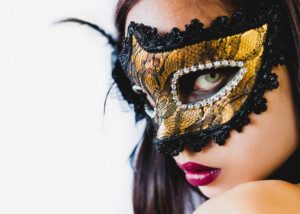There’s much content by autistic people about how crucial masking is for “surviving” in a neurotypical world, but do ALL autistic people mask?
Masking means the hiding of autistic behaviors and also the addition of neurotypical behaviors (e.g., body gestures, facial expressions, tone of voice, laughing, specific words to say in response to specific remarks).
In short, masking is when an autistic person makes an effort to present or “pass” as neurotypical (NT).
This can be done so proficiently that nobody notices that the individual is any different from anyone else.
For other autistic people, masking is done just enough to avoid coming off as too strange or overtly odd — though a little quirkiness is still noticeable.
Why do autistic people mask?
• Some say to “survive.” This usually refers to the workplace, where oddness or being thought of as “weird” might get the employee fired or harassed.
• To make and keep friends. Many autists want friendships but fear that their authentic selves will turn people off.
• So neighbors don’t think they’re the “weirdest on the block.”
• To find a romantic partner.
• Masking may become so pervasive that they do it even with one-time encounters with strangers.
One might conclude, then, that every autistic person on the high end of the spectrum at some point decides to pursue in-depth masking.
Masking to pass involves a lot of observation of people and much practice, plus scripted and rehearsed responses (including body language and facial expression) to anticipated circumstances.
However, not all scripting and rehearsing is done to pass as NT; it can also be done to be as efficacious, thorough and convincing as possible in communicating a concept.
People Who Exhibit Autistic Traits in Public

©Lorra Garrick
Certainly, some mildly autistic people don’t mask much in public, e.g., move atypically, show few emotions and engage in stimming behaviors.
NTs perceive them as eccentric, different, peculiar, nervous, edgy or some other descriptor outside the realm of “typical” or “normal.”
This minimal or even absence of any masking may be due to having gotten sick and tired of previous heavy masking and just giving it up for the sake of their mental health.
But could it also be because that individual NEVER masked much in the first place?
Does every autistic person mask?
This begs the million-dollar question: Do all zero- to low-support-needs autistic people, at one point or another, become skilled at masking to the point where they can pass as NT or, to put another way, pass as non-autistic?
“Some individuals choose to mask, while others do not,” says Dr. Meghan T. Lee, clinical neuropsychologist and practice owner, Horizon Neuropsychological Services in Colorado.
“Some individuals find it difficult to mask, while others do not,” adds Dr. Lee.
Full-on masking is freaking difficult for some autistic people, which is why they never develop the capacity to pull it off beyond a minimal level.
Masking means acting in a way that goes against their grain. When prolonged over the day, it’s taxing or draining.
An example of minimal masking: reminding themselves to nod at recurring intervals while in a conversation, while at the same time, suppressing the urge to rock side to side and tap their fingertips together.
However, other autistic traits are not suppressed, such as a neutral facial expression, a matter-of-fact or monotone voice, and wandering eyes while talking.
Another autistic trait that might not be subdued is what the person feels like saying. There’s no suppression of being bluntly direct, and there’s no suppression of abruptly changing the subject to one of that person’s intense interests.
This all adds up to light masking. And that person minimally masks either because heavier masking was too difficult to sustain and lead to a burnout, or, they never learned to mask convincingly.
Failing to convincingly mask or pass may be due to never feeling a need to go this far in the first place.
Or, it could be from multiple failed attempts and giving up early in the game. Continuous self-editing is draining!
“One’s masking abilities (and desire to mask) can also vary across the lifespan,” says Dr. Lee.
“There are many factors that play into this, such as symptom severity, neurocognitive abilities, psychological stability, support from family/friends, etc.”
In my case, it never really occurred to me to study and analyze “normal” behavior. It had never dawned on me that there could actually be a solution (though superficial) to feeling different from my classmates: mimic them.
Maybe it never dawned on me because, subconsciously, I knew — or at least, speculated — I could never convincingly pull this off. It was too much of a hardship to tackle, and I felt that without a guaranteed reward, the effort wouldn’t be worth it.
It was difficult enough simply emitting fake smiles and pretending to be interested in other people who bored me.
I thought I was stuck the way I was, just like a classmate with diabetes was stuck with that problem.
As a result, all throughout my schooling, kids and teachers could clearly see that I was wired differently.
Some ventures, when taken up in childhood, are easier to master than when taken up in adulthood, such as learning a new language or learning the violin,
Masking may be similar, in that if this is attempted in childhood, the young autist can more easily assimilate and “grow into it” and become adept over time, such that by the time they’re adults, they’re masters of masking (but are at high risk for a major burnout).
In my case, my college major was graphic design and art, so it wasn’t all that unexpected that I was perceived as odd or strange.
I was also a musician and budding writer. Of COURSE we artists and creative thinkers are supposed to be unusual!
After college I had jobs in environments where being a little peculiar or different was more tolerated than in most workplaces!
To any autistic person seeking employment: Get a job in a newspaper production department. You can get away with being the purple unicorn as long as you’re productive.
The Takeaways

rawpixel.com/Freepik.com
• Not all mildly autistic people fully mask – and this could be due to a few reasons, as already discussed.
• Not all autistic people even once fully masked all day long.
• Nobody knows what percentage of mildly autistic people do zero masking, but most autistic individuals do some degree of masking some of the time.
• Masking isn’t the only approach that some autistic people rely upon to function in a neurotypical world. Some simply decide, “This is the way I am; take it or leave it.”
• Neurotypicals fake behaviors, too, but not as often or as extensively as do autistics. It also comes easier to them.
• Whether or not a young autistic decides to mask as a coping strategy depends on multiple factors including family environment, school environment and their chosen line of work as an adult.
 Horizon Neuropsychological Services, LLC, owned by Dr. Meghan T. Lee, conducts neuropsychological evaluations for all ages. Our doctors evaluate for many conditions including autism spectrum disorder, ADHD, anxiety, depression, OCD, psychosis and behavioral difficulties. Our doctors show how patients can build upon their strengths and work around their weaknesses to be the best version of themselves.
Horizon Neuropsychological Services, LLC, owned by Dr. Meghan T. Lee, conducts neuropsychological evaluations for all ages. Our doctors evaluate for many conditions including autism spectrum disorder, ADHD, anxiety, depression, OCD, psychosis and behavioral difficulties. Our doctors show how patients can build upon their strengths and work around their weaknesses to be the best version of themselves.
 Lorra Garrick has been covering medical and fitness topics for many years, having written thousands of articles for print magazines and websites, including as a ghostwriter. She’s also a former ACE-certified personal trainer. In 2022 she received a diagnosis of Level 1 Autism Spectrum Disorder.
Lorra Garrick has been covering medical and fitness topics for many years, having written thousands of articles for print magazines and websites, including as a ghostwriter. She’s also a former ACE-certified personal trainer. In 2022 she received a diagnosis of Level 1 Autism Spectrum Disorder.
.
Top image: ©Lorra Garrick
Do Autistic People Feel Different Among Other Autistic People?
I’m Autistic, Identity First Language! I Don’t “Have Autism”










































